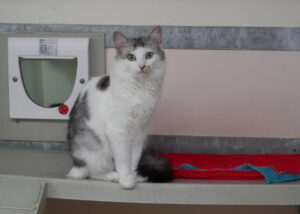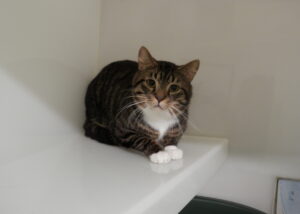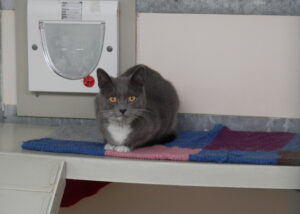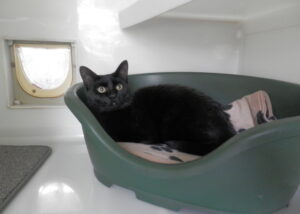Neutering
Neutering has many health benefits for your pet.
Neutering is an operation done under general anaesthetic to permanently prevent reproduction. In males it is called castration and in females it is called spaying.
Why neuter your cat?
Did you know that one unneutered female cat can be responsible for 20,000 kittens in just 5 years! Incredible isn’t it. Each year we take in many pregnant females, or those who have given birth outside and are struggling to care for themselves and their kittens.
Female cats should be neutered at around 4 and a half to 5 months old (before their first season), please seek advice from your Vet. It is a myth that they should be allowed to have at least one litter. A female cat can get pregnant again straight after having a litter. Unneutered females are more likely to suffer from pyometra in later life, and can also spread infectious diseases to their kittens.
Unneutered males may spray in the house, be very territorial and even aggressive to their owners. They may be more likely to stray if they have not been neutered, and get into fights with other cats. Fighting males are more likely to spread diseases such as FIV and FeLV, and develop abscesses from fight wounds.
Its costs around £60 to spay a female cat and £40 to castrate a male cat. If you are on a low income, you may be able to get help neutering your cat from one of these organisations: Cats Protection and PDSA.
Why neuter your dog?
Every year, thousands of puppies will find themselves abandoned across the UK, often as a result of unplanned breeding. It can be very difficult to find homes for a litter and it is not uncommon for Leicester Animal Aid to see dogs that have had several homes in a short space of time before they eventually end up in Rescue. Dogs do not recognise family groups and may mate with their close relatives which can increase the likelihood of birth defects in the puppies. Wanting a ‘copy’ of an existing dog rarely produces offspring that are identical in looks and behaviours. There can be health complications for pregnancy and birth.
Neutering will not stop all undesirable behaviours, but it can help with dogs that are roaming, mounting humans and furniture, some types of aggression and marking indoors. Male dogs can smell a bitch in heat from up to a mile away, and whilst they may usually be very well trained, their hormones can take over and they may roam across roads to try and find what they are looking for. There is a real danger of road traffic accidents. Unneutered males should be microchipped in case they roam.
The age at which neutering can take place can depend on the breed of the dog so it is best to discuss this with your veterinary surgeon. Neutering typically costs between £100 and £300 depending on the size of the dog. There may be assistance available for people on low incomes by contacting the PDSA.











